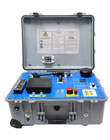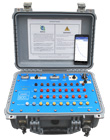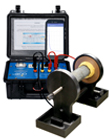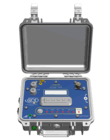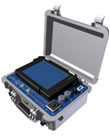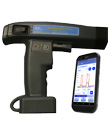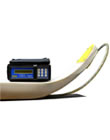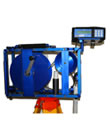Prospecting and Exploration Articles
Instrumentation GDD's Beep Mat- Is prospecting dead?
by Edwin Gaucher, Eng., Ph.D. and Pierre Gaucher, Eng., MBA
The Ontario Prospector-Spring/summer 2006
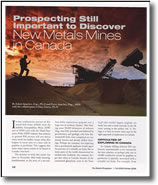 Are the prospectors still useful with all the new tools available to the exploration manager, such as airborne EM and magnetic surveys, geochemistry, the diamond drill, etc? [...] If most of the mines in Canada were found next to a surface showing, think of how many more Voisey Bay and Eleonore mines can be found with help of prospectors [...]
Are the prospectors still useful with all the new tools available to the exploration manager, such as airborne EM and magnetic surveys, geochemistry, the diamond drill, etc? [...] If most of the mines in Canada were found next to a surface showing, think of how many more Voisey Bay and Eleonore mines can be found with help of prospectors [...]
Read more : Instrumentation GDD's Beep Mat- Is prospecting dead?
Findings Mines in Canada
by Edwin Gaucher, Eng., Ph.D.
The decision to present this paper was taken in November 2002 while listening, dumbfounded, to the story of a ten million dollar exploration program over a huge area in northern Quebec. After some fifty thousand kilometers of airborne Mag, then EM, preceded and followed by geochemistry and geology, only four DDH were drilled on two already known and already drilled showings.
Read more : Finding mines in Canada
Prospecting Still Important to Discover Metal Mines in Canada
by Edwin Gaucher, Eng., Ph.D. and Pierre Gaucher, Eng., MBA with the collaboration of Dave Emery, Ph.D.
The Ontario Prospector-Fall 2003/ Winter 2004
In-situ conductivity surveys of diamond-drill holes (DDH) with the Sulfides, Susceptibility, Waste (SSW) and of DDH cores with the Multi-Parameter Probe (MPP) indicate that airborne or ground EM surveys will not detect many metal ore bodies, except when they happen to occur next to a layer rich in graphite or pyrrhotite. This suggests that many major miner remain to be found in Canada - but how?
Read more: Prospecting Still Important to Discover Metal Mines in Canada
The New SSW Probe: A new high-tech tool to raise ore grades by reducing dilution within metal mines.
by Pierre Gaucher, Eng., MBA
Presented at the 2000 National CIM Meeting, held in Québec, Canada
It is possible to selectively mine an orebody by combining the use of the SSW probe with any bulk mining methods as well as narrow vein exploitations. In other words, thanks to the use of the SSW probe, mining operators will be able to reduce and control dilution that is generally associated to every mining operation. Already quick and substantial savings have been obtained.
Read more: The New SSW Probe: A new high-tech tool to raise ore grades by reducing dilution within metal mines.
Who Will Find the Next Voisey's
by Pierre Gaucher, Eng., MBA
The Voisey's Bay News, October 1995
Beep Mat Detector is an affordable method of identifying near surface gossans.
Read more : Who Will Find the Next Voisey's
A secret weapon - if you want to find or operate a mine
by Pierre Gaucher, Eng., MBA
NATIVE JOURNAL, April 2000
If an instrument is used by Falconbridge Limited in their Sudbury mines to define where the ore and waste are, one would assume that the same instrument be adopted by the prospectors to find where the ore is within the waste... Well, the mining industry has adopted it fast, but the prospectors are still hesitating. Let me explain.
Read more : A secret weapon - if you want to find or operate a mine
A New Frontier In Exploration For Canada
by Edwin Gaucher, Eng., Ph.D.
A compilation of a number of DDH surveyed either with Pulse EM or with the GDD SWW probe indicates that the sulphides in many of the base and precious metal mines in Canada are not conductors.
Read more : Exploring For Mines That Are Not Conductors
Why Prospect with the Beep Mat
by Edwin Gaucher, Eng., Ph.D.
Before investing in a Beep Mat project, many people may wonder why the Beep mat is still not used on a large scale by the mining industry even though it is an extraordinary successful. At the end of one of our projects, I experienced something that should help you understand why professional explorers are still reluctant to use the Beep Mat.
Read more: Why Prospect with the Beep Mat
A New Frontier in Exploration in Canada
by Edwin Gaucher, Eng., Ph.D.
NATIVE JOURNAL, August-September 2003
Except for diamonds, Canada is slowly becoming a nation of old mines, mining lower grade or deeper deposits, and therefore facing closures.
Read more: A New Frontier in Exploration in Canada
An Innovative Strategy To Discover New Showings In The Lynn Lake/Greenstone Belt, Northwestern Manitoba Region
by Edwin Gaucher, Eng., Ph.D. and Mr. Mark Matiasek, M.R.D.
The role of prospectors in the mining industry cannot be overstated. In the early years of prospecting, prospectors used their experience, relied upon primitive technology, and with luck and hard work, major deposits were found. Early prospectors have been successful in mining exploration in part due to glaciations of most of Canada, in particular the Canadian Shield.
First Nations people use technology to their advantage
NATIVE JOURNAL, August 1999
Since people have started to find mines in Canada, the First Nation people were associated with many discoveries. First Nation people prospected and found many mines for small and large exploration companies.
Read more: First Nations people use technology to their advantage
How To Find A Mine Fast And Inexpensively
NATIVE JOURNAL, January 2000
Today, any person owning a snowmobile could have found Kidd Creek, the biggest copper-zinc mine in Canada, while comfortably riding his machine at 25 km/h, and pulling one of the new Y2K Beep Mats. Those are almost the words of Terry Podolsky, ex-V.P. Exploration of Inco. Massive chalcopyrite occurred four feet below the moss of a swamp under which that orebody was hidden.
Read more : How To Find A Mine Fast And Inexpensively
How Henry Linklater, prospector, discovered Thompson orebody and how you can find more like it…
by Pierre Gaucher, Eng., MBA
Here are a few reasons and references why a prospector may wish to use the Beep Mat to help him to find a showing and potentially a mine more quickly and inexpensively than any other approach currently available.
Read more : How Henry Linklater, prospector, discovered Thompson orebody and how you can find more like it…
Tricks on exploration
NATIVE JOURNAL, September 2000
Many people in exploration are well qualified and know how and where they should be looking to find the next mine. But, these days, there are fewer active companies and people have less and less time to exchange ideas. For different reasons, innovative ideas are often not communicated, even with colleagues sharing the same office.
Read more : Tricks on exploration
Creating a mining consortium a window of opportunity
NATIVE JOURNAL, July 2000
This article will define what is slowing down the progress and then suggest some steps that could be taken today to make it happen faster.
Read more : Creating a mining consortium a window of opportunity
Stop screening- Start drilling!
by Edwin Gaucher, Eng., Ph.D.
The Canadian Mining and Metallurgical Bulletin, January, 1975
Exploration Criteria have a value only if successful. Most discoveries are evident at some point in time, quite often, the turning point is the first drill hole. Back in 1975, scores of geologists from around the world requested reprints of this paper. Back then, photocopiers were not widespread. This response, and the author's frustration of never having enough funds to drill motivated him to create the Beep Mat. Thus, one can trench the near surface targets, and reserve diamond drilling for the ones buried deep.
Read more : Stop screening- Start drilling!

